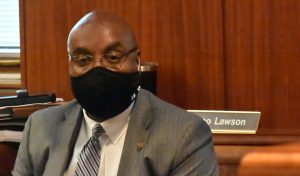Jeffco Commission Goes Behind Closed Doors Over Stimulus Money
By Solomon Crenshaw Jr.
The Jefferson County Commission followed a 45-minute meeting with an hour-long executive session today as commissioners received guidance on their use of federal stimulus money because of the COVID-19 pandemic.
In calling for an executive session, County Attorney Theo Lawson cited the state statute regarding pending litigation and matters likely to be litigated in court.
“There are already three entities that are already set up by the President to do audits and investigations on the manner in which these moneys are to be spent,” Lawson told BirminghamWatch. “That could include lawsuits to bring back and recoup those moneys in the event something happens.
“Those are matters that could potentially be litigated by the DOJ (Department of Justice),” the county attorney said. “They can be involved with the Office of the Inspector General, and other entities that may/could bring actions, depending on the actions we take with regard to these funds.”
Jefferson County received $115 million, its share of the $2 trillion stimulus bill, the CARES Act. That money was given to blunt the impact of an economic downturn set in motion by the global coronavirus pandemic.

Solomon Crenshaw Jr., BirminghamWatch
Jefferson County Attorney Theo Lawson.
County Manager Tony Petelos has said that money can’t supplement losses in budgets or revenues.
During the meeting, commissioners heard a report from Carletta Singleton, partnership coordinator of the Census Bureau of Alabama. Singleton spoke via Commissioner Sheila Tyson’s cellphone, which Tyson held to a microphone.
“Currently the state of Alabama leads the Atlanta Region in 2020 Census response rate,” Singleton said. “Persons participating in this census is at about 55 percent. We are behind the national average but we are leading the region of seven states across the Southeast.”
Jefferson County is in the top 30 counties, she said, with a 57 percent response rate, which helps to buoy the state rate.
“That’s good news in terms of trending where we need to be,” the census official said. “The governor’s goal is 80 percent for the entire state. In, 2010, Jefferson County’s response rate was in the 60 percentile. We at least want to get beyond or above that 60 percentile range in terms of response rate.”
In another matter, Tyson announced a Mother’s Day Food Distribution at Birmingham Urban League, 1229 Third Avenue North in Birmingham. The event, set for 11 a.m. to 1 p.m. on Saturday, May 9, honors mothers of newborns and toddlers.
HUD proposes time limits and work requirements for rental aid
The rule would allow housing agencies and landlords to impose such requirements "to encourage self-sufficiency." Critics say most who can work already do, but their wages are low.
Paramount and Warner Bros’ deal is about merging studios, and a whole lot more
The nearly $111 billion marriage would unite Paramount and Warner film studios, streamers and television properties — including CNN — under the control of the wealthy Ellison family.
A new film follows Paul McCartney’s 2nd act after The Beatles’ breakup
While previous documentaries captured the frenzy of Beatlemania, Man on the Run focuses on McCartney in the years between the band's breakup and John Lennon's death.
An aspiring dancer. A wealthy benefactor. And ‘Dreams’ turned to nightmare
A new psychological drama from Mexican filmmaker Michel Franco centers on the torrid affair between a wealthy San Francisco philanthropist and an undocumented immigrant who aspires to be a dancer.
Bill making the Public Service Commission an appointed board is dead for the session
Usually when discussing legislative action, the focus is on what's moving forward. But plenty of bills in a legislature stall or even die. Leaders in the Alabama legislature say a bill involving the Public Service Commission is dead for the session. We get details on that from Todd Stacy, host of Capitol Journal on Alabama Public Television.
My doctor keeps focusing on my weight. What other health metrics matter more?
Our Real Talk with a Doc columnist explains how to push back if your doctor's obsessed with weight loss. And what other health metrics matter more instead.






